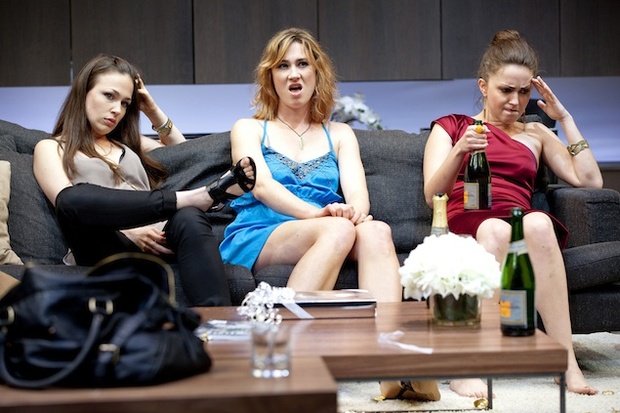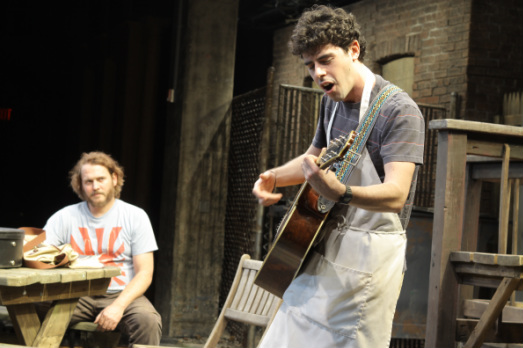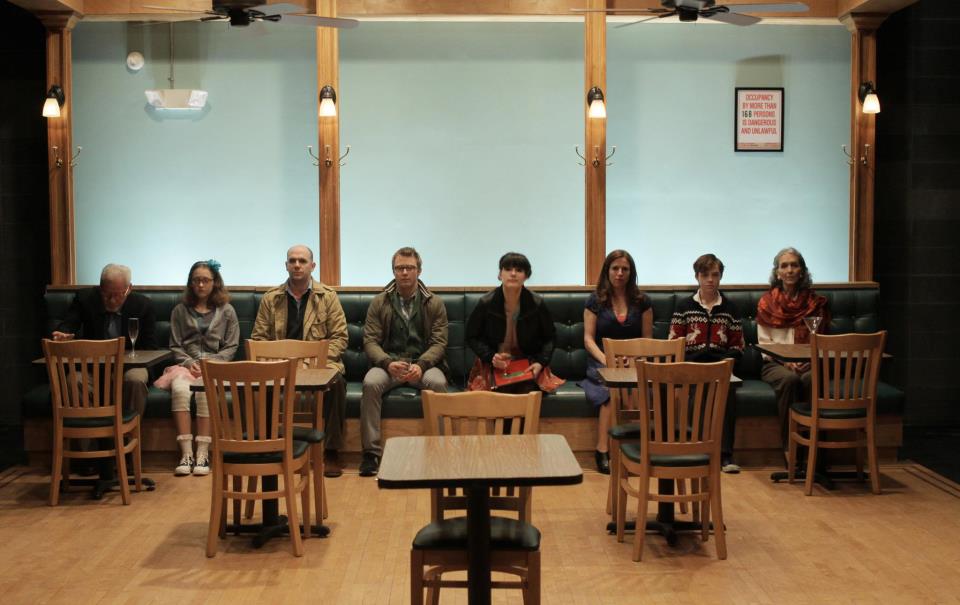|
JACQUELINE LAWTON: Why did you decide to get into theatre? Was there someone or a particular show that inspired you?
LAUREN HALVORSEN: Musicals were my gateway drug; I saw a high school production of Guys and Dolls when I was eight and it was all gloriously downhill from there. I didn’t hear the word ‘dramaturg’ until I was 20, and when someone explained it to me, I remember thinking, “Wait, that’s really a job? Sign me up.” JL: How do you define dramaturgy? Or explain to people the work that you do? LH: My father asks me a version of this question every time I see him. I actually struggled with it for years, because many of the definitions I’ve heard are just weird, nondescript metaphors that veer into eye-rolling pretension (“keeper of the text” is the absolute worst, with “the play’s midwife” a close second), but my wonderful cohort at Studio, Adrien-Alice Hansel, once described a dramaturg as “a smart, attentive early audience member” for the play and now I use that all the time. It’s actually wise to assume that any time I sound mildly articulate, it’s because I’m paraphrasing something Adrien said first. JL: How long have you lived and worked as a dramaturg in DC? What brought you here? Why have you stayed? LH: I moved to DC from Houston about a year and a half ago, and I came here specifically for the job at Studio. I had been working at a large theatre company that produced a wide variety of work--classics, musicals, new American plays. It was an amazing training ground, but it helped me realize that I wanted to focus exclusively on contemporary and new work. Studio was in the midst of its artistic transition and launching the new play and international initiatives, so it seemed like an exciting time to join. I’ve stayed here because it’s the best job I’ve ever had and DC has quickly become home--though I really miss being in proximity to good queso and breakfast tacos. JL: If your work as a dramaturg doesn’t pay the bills, what else do you do? How do you balance this work with your dramaturgy? LH: I’ve been extremely fortunate in that I’ve always worked as a dramaturg within the cozy, fiscally supportive womb of an institution. Freelance dramaturgy takes a tenacity and ferocity and hustle that I completely lack and I’m endlessly in awe of those who make it work (see: Taylor Hitaffer, Jamila Reddy) JL: What skills and traits do you feel a successful dramaturg should have to support the development of a new play or a production? LH: I’ve actually never dramaturged a new play—I’ve spent years in and around new play development processes, but I’ve never dramaturged a production with the playwright in the room. But I think the two most important qualities of any dramaturg, regardless of the type of production you’re working on, are the ability to listen and an innate sense of curiosity. JL: What is the greatest part of being a dramaturg? What has been your most difficult challenge? LH: It sounds inane, but I get to think and read and write and scheme and collaborate for a living. As far as challenges, when I first started dramaturging, I was kind of thrown into a professional environment with zero training and experience, which led to some crippling insecurity and anxiety. It took me a long time to trust that my artistic opinion was of value and that I deserved to be at the table. JL: Who are your favorite playwrights? What is it about their work that inspires or draws you to them? LH: Oh, this question is always so hard. I met with an MFA playwriting student last week who asked me what contemporary playwrights she should be reading and I sent her a list of like forty people. For the sake of brevity, I’ll single out Annie Baker, Amy Herzog, and Dan Lefranc. All three have made me re-define my ideas about theatricality and authenticity onstage. JL: DC audiences are ... LH: Smart, cultured, and delightfully inquisitive. I’ve been so surprised and humbled by the high level of engagement and intellectual discourse. JL: DC actors, designers and directors are .. LH: Generous and nimble. JL: DC playwrights are … LH: I regrettably only know a handful personally—Danielle Mohlman, David Robinson, Tim Guillot, Kat White—and I think they’re all brilliant, charming, and intrepid, so I’m going to assume that those are universal qualities—and I look forward to connecting with more local writers to support this theory. JL: DC critics are ... LH: Thoughtful, penetrating, and articulate. I’ve never worked in a city with such a wide range of critical voices. JL: How do you feel the DC theatre community has addressed the issues of race and gender parity? How has this particular issue impacted you and your ability to get your work produced on the main stages? LH: I’ll be interested to hear how my fellow interviewees respond to this question, particularly those who’ve lived here longer than I have and have worked at more than one institution. I think we all have a responsibility to produce stories that reflect our communities, and I think as a community we need to emphasize that gender and racial parity in theatre includes but extends beyond the authors and subjects of the works we’re producing--it’s also about ensuring DC theatres are hiring diverse collaborators on every level of a production. JL: What advice do you have for an up and coming DC based dramaturg who has just moved to D.C.? LH: The best way to educate yourself about DC theatre is to see DC theatre. Read a lot of plays (Tryst and The Coffee Bar have excellent chai and comfy couches) If there’s someone in town whose career you admire, or if there’s a company that’s doing work you find exciting, email them and ask if you can pick their brain over coffee. Finding good mentorship is the best thing a young dramaturg can do. It’ll take time and perseverance, but you’ll find your tribe. I think it’s also important to remember that there’s not one tried and true path to being a dramaturg. I studied English and art history in college, did a few internships in lieu of grad school, and then moved from Philly to Pittsburgh to Houston to DC within a five-year period in pursuit of different literary gigs. Everyone’s career trajectory is wildly different, so be open to whatever comes your way. JL: What's next for you? Where can we keep up with your work? LH: I’ll be dramaturging Tom Stoppard’s The Real Thing at Studio later this season, and this June I’ll be dramaturging a staged reading of Danielle Mohlman’s Nexus for Field Trip Theatre. It’ll be my first time working with a playwright in the room, and I’m really thrilled it’s Danielle.
1 Comment
4/19/2013 05:15:23 am
Thanks to the articulate Lauren for her fresh and candid take on dramaturgy and the DC scene! I enjoyed this interview.
Reply
Your comment will be posted after it is approved.
Leave a Reply. |
My BlogI'm a playwright, dramaturg, and teaching artist. It is here where you'll find my queries and musings on life, theater and the world. My posts advocate for diversity, inclusion, and equity in the American Theatre and updates on my own work. Please enjoy!
Categories
All
Archives
June 2020
Reading List
|



